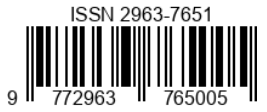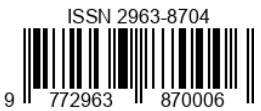Filsafat Pendidikan Dalam Pengembangan Sains Berbasis Kearifan Lokal
DOI:
https://doi.org/10.55606/jhpis.v1i3.543Keywords:
philosophy; science/science; Local culture.Abstract
Humans have the ability to think and always try to improve their knowledge. Human nature is naturally full of curiosity so humans are always looking for answers to their curiosity. Humans seek answers to their curiosity through knowledge, and through knowledge will lead to its own satisfaction according to the demands of the times. The knowledge gained is not only knowledge, but is emphasized on knowledge and truth. Learning everything by studying the right scientific foundation is one of the efforts made by humans to obtain the truth. This study aims to determine the nature of the philosophy of education in the development of science based on local wisdom. The surrounding nature gives birth to local wisdom that is unique and is a potential in the development of science. Science or science which includes physics, chemistry, biology using scientific steps, scientific thinking, and using scientific frameworks. This is the beginning of the philosophy of science used to study, uncover, and solve scientific problems for human life. This study discusses the importance of a person in developing science based on local wisdom as a means of maintaining natural resources, culture, customs that exist in people's lives.
Downloads
References
Alit Mariana, I M. 2009. Hakikat IPA dan Pendidikan IPA. Bandung: PPPPTK IPA.
Assefa, Y., & Mohammed, S. J. (2022). Indigenous-based adult education learning material development: Integration, practical challenges, and contextual considerations in focus. Education Research International, 2022 doi:https://doi.org/10.1155/2022/2294593
Bakhtiar, A. (2012). Filsafat Ilmu. Jakarta: PT Raja Grafindo Persada.
Biyanto. 2018. Filsafat Ilmu dan Ilmu Keislaman. Yogyakarta: Pustaka Pelajar.
Bunge, M. (1970). The physicist and philosophy. Zeitschrift für allgemeine Wissenschaftstheorie / Journal for General Philosophy of Science, 1, 196-208.
Hamdani.2011. Filsafat Sains, Bandung: Pustaka setia.
Habibah, S. (2017). Implikasi Filsafat Ilmu terhadap Perkembangan Ilmu Pengetahuan dan Teknologi. DAR EL-ILMI : Jurnal Studi Keagamaan, Pendidikan Dan Humaniora, 4(1), 166-180.
Hidayatullah, S. (2006). Relasi Filsafat dan Agama (Perspektif Islam). Jurnal Filsafat, 40(2), 128–148. https://doi.org/10.22146/jf.31271
Mahdi Ghulsyani. 1999. Filsafat Sains menurut Al-Qur’an. Bandung: Mizan.
Mohammad Adib.2018. Filsafat Ilmu. Yogyakarta: Pustaka Pelajar.
Rapar, J. H. (2001). Pengantar Filsafat. Yogyakarta: Kanisius.Syapul Hayat. 2020. Hakikat Sains dan Inkuiri. 28 November 2020.
Tafsir, A. (2005). Filsafat Ilmu Mengurai Ontologi, Epistemologi, dan Aksiologi Pengetahuan. Jakarta: PT Remaja Rosdakarya.
Usman Samatowa. (2011). Pembelajaran IPA Disekolah Dasar. Jakarta: PT Indeks
Widiantari. 2012. Model Pembelajaran Konvensional. Bandung: Pustaka Setia.
Zaprulkhan. 2018. Filsafat Ilmu (Sebuah Analisis Kontemporer). Depok: Rajawali Pers.








